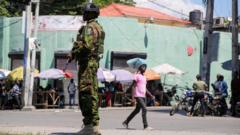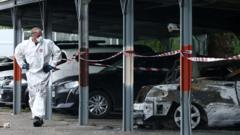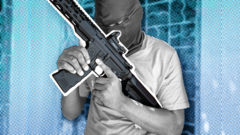Haiti finds itself in the grip of a deeply troubling wave of gang violence, with the latest report revealing a heinous massacre in Port-au-Prince. A total of 110 mostly elderly individuals have been brutally killed by gang members, according to the National Human Rights Defence Network (RNDDH). The killings were reportedly incited by a gang leader whose son succumbed to an unspecified illness, with a local voodoo priest accusing elderly residents of practicing "witchcraft." The United Nations has noted that the death toll due to gang violence in Haiti has soared to a staggering 5,000 this year.
**Tragedy in Haiti: Elders Executed Amidst Witchcraft Allegations**

**Tragedy in Haiti: Elders Executed Amidst Witchcraft Allegations**
Summary of a horrific gang-led massacre in Port-au-Prince leaves over 100 elderly dead, accused of witchcraft following a gang leader's family tragedy.
Emerging reports detail the horrific events that unfolded over the weekend, with UN human rights chief Volker Türk identifying "184 deaths resulting from orchestrated violence led by a prominent gang figure." The victims, primarily aged over 60, were rounded up from their homes in the Wharf Jérémie area and brutally executed using firearms and bladed weapons. Disturbingly, witnesses reported seeing dismembered bodies set ablaze on the streets as the violence unfolded. While RNDDH maintains that all victims were senior citizens, other organizations suggest that some younger individuals, who attempted to defend the elderly, also lost their lives.
The gang responsible for this atrocity is reportedly led by Monel Felix, also known as Mikano, who controls Wharf Jérémie—a strategically important region within the capital. The area’s dense population and gang influence have hindered security forces’ attempts to intervene. Local sources claim that the gang’s efforts to maintain tight control over Wharf Jérémie prevented information about the massacre from circulating quickly.
These tragic events come in the wake of escalating territorial conflicts among gangs following a relatively calm period from May to September. The assassination of President Jovenel Moïse in 2021 has left a power vacuum that various gangs have exploited, propelling Haiti into unprecedented violence, with civilians suffering the brunt of the conflict.
In addition to the immediate violence, the humanitarian crisis is deepening, as gangs now control approximately 85% of Port-au-Prince, causing widespread displacement. The International Organization for Migration cites over 700,000 internally displaced individuals, half of whom are children. Human rights organizations continue to report rampant sexual violence as a tactic of intimidation employed by gang members.
An international policing effort led by Kenya has yet to make a significant impact. The Multinational Security Support Mission arrived to assist the Haitian National Police in June but faces challenges including funding and logistical support. Meanwhile, the Transitional Presidential Council, responsible for restoring governance, is struggling to fulfill its mandate, leaving the political landscape in disarray.
As the grim reality unfolds, Haiti continues to face overwhelming adversity amid mounting gang violence and social collapse.
The gang responsible for this atrocity is reportedly led by Monel Felix, also known as Mikano, who controls Wharf Jérémie—a strategically important region within the capital. The area’s dense population and gang influence have hindered security forces’ attempts to intervene. Local sources claim that the gang’s efforts to maintain tight control over Wharf Jérémie prevented information about the massacre from circulating quickly.
These tragic events come in the wake of escalating territorial conflicts among gangs following a relatively calm period from May to September. The assassination of President Jovenel Moïse in 2021 has left a power vacuum that various gangs have exploited, propelling Haiti into unprecedented violence, with civilians suffering the brunt of the conflict.
In addition to the immediate violence, the humanitarian crisis is deepening, as gangs now control approximately 85% of Port-au-Prince, causing widespread displacement. The International Organization for Migration cites over 700,000 internally displaced individuals, half of whom are children. Human rights organizations continue to report rampant sexual violence as a tactic of intimidation employed by gang members.
An international policing effort led by Kenya has yet to make a significant impact. The Multinational Security Support Mission arrived to assist the Haitian National Police in June but faces challenges including funding and logistical support. Meanwhile, the Transitional Presidential Council, responsible for restoring governance, is struggling to fulfill its mandate, leaving the political landscape in disarray.
As the grim reality unfolds, Haiti continues to face overwhelming adversity amid mounting gang violence and social collapse.

















